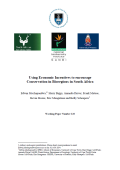In its flagship report, the German Advisory Council on Global Change (WBGU) elaborates explicitly on the fact that the technological potential for comprehensive decarbonisation is available, outlines business and financing models for the transition, and points out that the political instruments needed for a climatefriendly transformation are widely known. The council also describes how the requisite transformation encompasses profound changes to infrastructures, production processes, regulation systems and lifestyles, and extends to a new kind of interaction between politics, society, science and the economy. Various multilevel path dependencies and obstacles must be overcome. Furthermore, the transformation can only succeed if nation states put global cooperation mechanisms before their own shortterm oriented interests, in order to make a trend reversal, particularly as far as the global economy is concerned, towards climatefriendliness and sustainability possible. And not least, from a global perspective, this is also about issues of fairness – issues that need resolving.
This paper outlines a conceptual and policy approach to bringing social concerns to the forefront of green economy and sustainable development debates. It examines a wide range of social problems and other issues associated with green economy, reasserting that any development transformation must be both green and fair; leading to a green society not just a green economy. However, different transition pathways exist, each with different developmental implications. This paper addresses the key role of social policy, agency and participation in crafting transition paths that are green and fair. A comprehensive or transformative social policy is argued to play a key role in mitigating unfair consequences, influencing behaviour and transforming patterns of inequality. This paper concludes by highlighting issues of fragmentation associated with knowledge, institutional arrangements and socil agency, and suggests the need for 'joined-up analysis, policy and action'.
This summary was prepared by Eldis.
In 1992, governments gathered for the United Nations Conference on Environment and Development in Rio de Janeiro. The “Rio Declaration” laid out several principles of sustainable development, including the central role of policy instruments. This article takes stock of where we stand today in implementing sound and effective environmental policy instruments throughout the world, particularly in developing and transitional economies. It agures that, as our experience with market-based environmental policies has deepened over the past two decades, so has the ability to adapt instruments to complicated and heterogeneous contexts—but we are only just beginning, and the need to be further along is dire. One key factor may be that economists have not yet meaningfully accounted for the importance of political feasibility, which often hinges on risks to competitiveness and employment, or on the distribution of costs rather than on considerations of pure efficiency alone.

Many protected areas are not successfully conserving biodiversity, often despite adequate management within their borders. Changes in land use outside protected areas can alter ecological function inside protected areas and result in biodiversity loss given that protected areas are almost always parts of larger ecosystems. Economic incentives are seen as one of the most promising avenues to influence conservation goals. This paper deals with enabling these in the now commonly accepted notion of bioregional landscape management. It suggests a holistic framework to help understand where and how such incentives may function. It then discusses a range of desired incentives, and relate as many of these as possible to potential underlying institutional changes. Without going into country-specific details, several southern African examples are used, all the while relating both principles and examples to bioregionalism. We conclude that incentives for bioregional conservation in southern Africa are far more likely to succeed if key institutions can be introduced.
Global warming and other impending environmental mega-problems call for a new technological paradigm. The urgency of the development and deployment of technological solutions is such that governments will need to make widespread use of ‘carrots and sticks’ to ensure that next-generation technologies are developed and deployed, more demanding standards and regulations are applied and stricter enforcement is guaranteed. To capture the main elements of this paradigm shift, we introduce the concept of Sustainability-oriented Innovation Systems (SoIS). SoIS make particularly high demands on governance, because governments need to disrupt unsustainable technological pathways and encourage alternative technologies long before they reach the stage of commercial viability. This implies picking winners in situations of technological uncertainty and highly disparate stakeholder preferences. SoIS also build on new types of policies that help to internalise environmental costs. The policy-driven nature of technological development may possibly result in a wide divergence of national technological trajectories.
